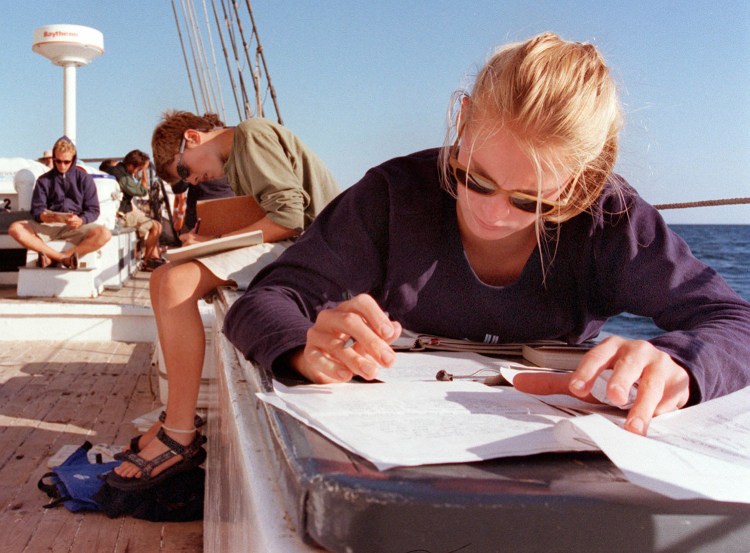An attempt to relaunch Ocean Classroom, a nonprofit that ran schooling-at-sea programs until its financial collapse last summer, is expected to be delayed because new backers failed to agree on terms for leasing a ship.
The Ocean Classroom Foundation, which was based in Damariscotta, shut down last summer after officials learned that two of the three ships it owned faced expensive and lengthy overhauls. The organization had fallen behind on a $2.2 million mortgage and would have needed about $1.4 million more to repair two of its ships, the Westward and the Spirit of Massachusetts, and probably another $100,000 for the third ship it owned, the Harvey Gamage.
A group of backers who want to resurrect the programs formed a new company, Ocean Classroom LLC, based in Portland, late last year. But a plan to lease the Harvey Gamage from local businessman Phineas Sprague fell through last week when Sprague and Ocean Classroom could not agree on financial terms. The company’s board, which expects to file papers as a nonprofit, is meeting Saturday to consider its options.
The failed deal with Sprague means the organization has no ship for its sea-based programs. The executive director, Margo Mallar, said she’s exploring options for other ships, which she declined to identify because no lease had been signed.
Ocean Classroom had planned on some land- and sea-based programs this summer, but wasn’t expected to launch its more extensive semester-at-sea trips until next year.
Sprague said he needed lease payments that would allow him to set aside money for a major overhaul every five years or so for the wooden-hulled Harvey Gamage.
Sprague owns the Harvey Gamage, Westward and Spirit of Massachusetts because he assumed title to the ships, and the balance on the mortgage owed to Camden National Bank, in exchange for releasing the liens on the ships from Sprague’s Portland Yacht Services. He has since sold the Spirit of Massachusetts, which has been moved to Kennebunk, where it’s being restored for use as a floating restaurant.
Sprague said he supports the effort to get Ocean Classroom going again, saying that a niece had gone on one of its programs and his son went on a similar voyage, and both benefited from the voyages. The foundation was founded in 1996.
“The experience is great for kids,” Sprague said.
But what Ocean Classroom said it could pay to lease the Harvey Gamage ended up being about a third of what Sprague figures he needs to maintain the ship.
“I’m really disappointed,” Sprague said.
Cyrus Hagge, who heads the new board for Ocean Classroom, said it was Sprague who suggested in December that Hagge get involved in trying to get Ocean Classroom restarted.
Hagge, a Portland developer, said the organization has been moving too fast and the failure to reach an agreement on a lease for the Harvey Gamage will give it most of the rest of the year to get better organized. For instance, he said, Ocean Classroom has yet to obtain its tax-exempt, nonprofit status, complicating fundraising efforts. It may take until early fall to get that settled.
“It’s time for Ocean Classroom to take a deep breath,” Hagge said. “We were going too fast. We were trying to build an airplane as we were flying it.”
Hagge said the board is likely to scrap plans for any major programs this summer and focus on fundraising later this year to get the program up and running. The goal now would be to restart the semester-at-sea program by summer 2016.
Mallar said the quality of Ocean Classroom Foundation’s programs – which she ran for two months last year before it shut down – was never an issue, but the group wasn’t well-run financially. For instance, she said, the nonprofit relied on a handful of wealthy donors to cover losses rather than launching extensive fundraising aimed at the programs’ alumni.
“We just have to retool,” she said.
She said Ocean Classroom received about $40,000 to operate over the winter from board members and has a major fundraising campaign planned. Mallar said she’s very careful about over-promising after the foundation’s collapse last year led to the cancellation of some programs with no refunds for parents who had put down deposits.
Both Hagge and Mallar said they hope to provide some refunds if the new organization is financially stable, although they note that the foundation and the new group are legally distinct.
Mallar said the new organization needs $250,000 to $300,00 to cover a first year of operation.
Send questions/comments to the editors.





Success. Please wait for the page to reload. If the page does not reload within 5 seconds, please refresh the page.
Enter your email and password to access comments.
Hi, to comment on stories you must . This profile is in addition to your subscription and website login.
Already have a commenting profile? .
Invalid username/password.
Please check your email to confirm and complete your registration.
Only subscribers are eligible to post comments. Please subscribe or login first for digital access. Here’s why.
Use the form below to reset your password. When you've submitted your account email, we will send an email with a reset code.